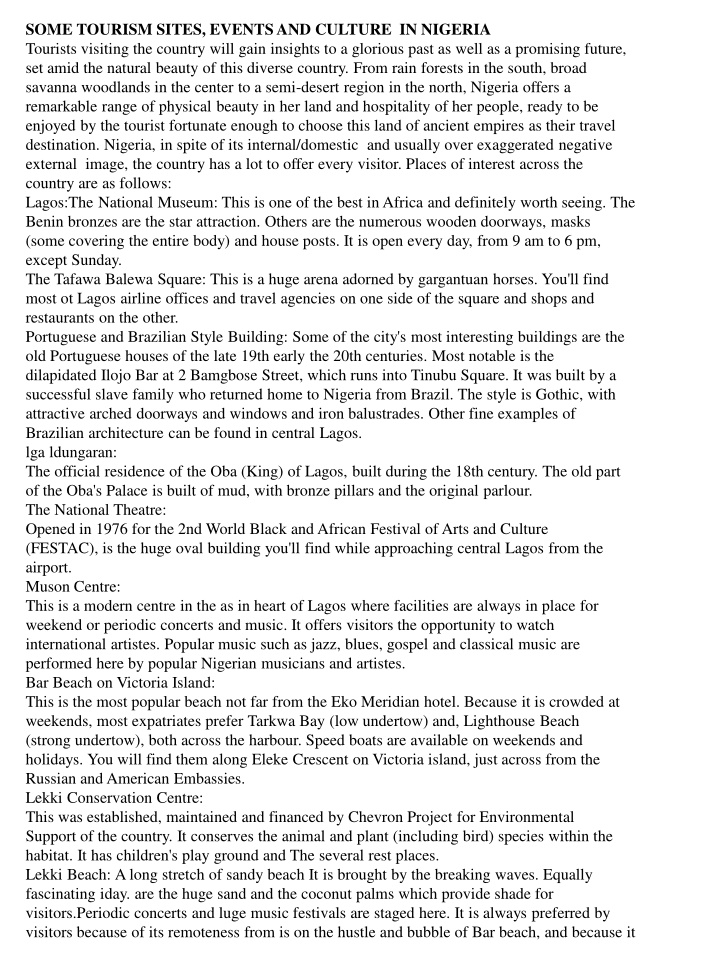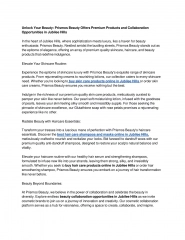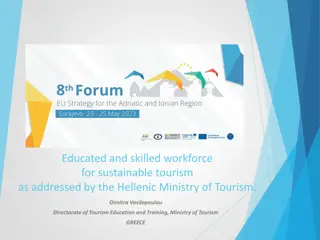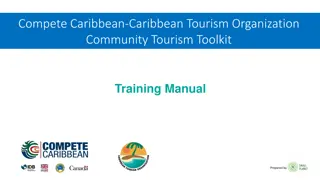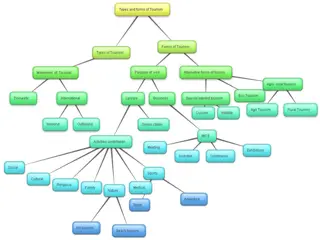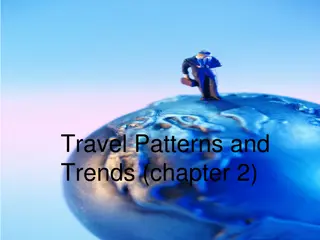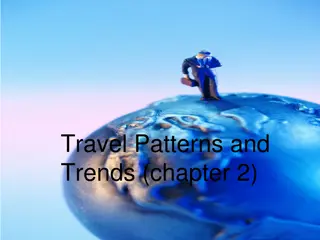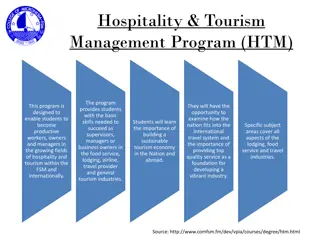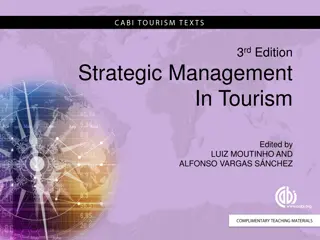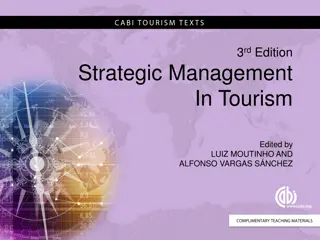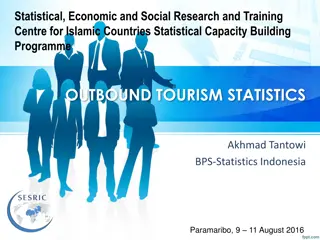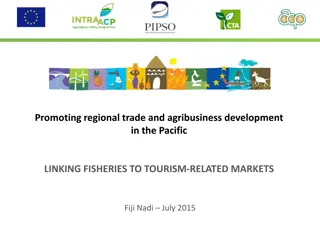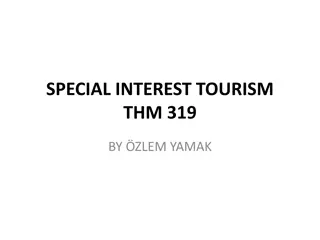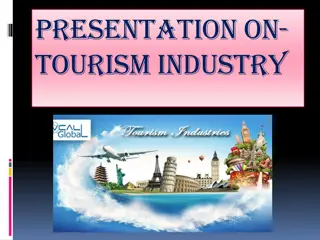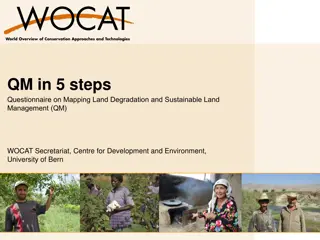Tourism in Nigeria: A Diverse Land of Beauty and Culture
"Discover the natural beauty, rich culture, and historical sites of Nigeria. Explore Lagos with its national museum, Tafawa Balewa Square, and Lekki Conservation Centre. In Abuja, experience rock climbing adventures at Gawa Hills and immerse in nature at Aso Rock. Nigeria offers tourists a blend of past glory and future promise amidst its diverse landscapes."
Download Presentation

Please find below an Image/Link to download the presentation.
The content on the website is provided AS IS for your information and personal use only. It may not be sold, licensed, or shared on other websites without obtaining consent from the author.If you encounter any issues during the download, it is possible that the publisher has removed the file from their server.
You are allowed to download the files provided on this website for personal or commercial use, subject to the condition that they are used lawfully. All files are the property of their respective owners.
The content on the website is provided AS IS for your information and personal use only. It may not be sold, licensed, or shared on other websites without obtaining consent from the author.
E N D
Presentation Transcript
SOME TOURISM SITES, EVENTS AND CULTURE IN NIGERIA Tourists visiting the country will gain insights to a glorious past as well as a promising future, set amid the natural beauty of this diverse country. From rain forests in the south, broad savanna woodlands in the center to a semi-desert region in the north, Nigeria offers a remarkable range of physical beauty in her land and hospitality of her people, ready to be enjoyed by the tourist fortunate enough to choose this land of ancient empires as their travel destination. Nigeria, in spite of its internal/domestic and usually over exaggerated negative external image, the country has a lot to offer every visitor. Places of interest across the country are as follows: Lagos:The National Museum: This is one of the best in Africa and definitely worth seeing. The Benin bronzes are the star attraction. Others are the numerous wooden doorways, masks (some covering the entire body) and house posts. It is open every day, from 9 am to 6 pm, except Sunday. The Tafawa Balewa Square: This is a huge arena adorned by gargantuan horses. You'll find most ot Lagos airline offices and travel agencies on one side of the square and shops and restaurants on the other. Portuguese and Brazilian Style Building: Some of the city's most interesting buildings are the old Portuguese houses of the late 19th early the 20th centuries. Most notable is the dilapidated Ilojo Bar at 2 Bamgbose Street, which runs into Tinubu Square. It was built by a successful slave family who returned home to Nigeria from Brazil. The style is Gothic, with attractive arched doorways and windows and iron balustrades. Other fine examples of Brazilian architecture can be found in central Lagos. lga ldungaran: The official residence of the Oba (King) of Lagos, built during the 18th century. The old part of the Oba's Palace is built of mud, with bronze pillars and the original parlour. The National Theatre: Opened in 1976 for the 2nd World Black and African Festival of Arts and Culture (FESTAC), is the huge oval building you'll find while approaching central Lagos from the airport. Muson Centre: This is a modern centre in the as in heart of Lagos where facilities are always in place for weekend or periodic concerts and music. It offers visitors the opportunity to watch international artistes. Popular music such as jazz, blues, gospel and classical music are performed here by popular Nigerian musicians and artistes. Bar Beach on Victoria Island: This is the most popular beach not far from the Eko Meridian hotel. Because it is crowded at weekends, most expatriates prefer Tarkwa Bay (low undertow) and, Lighthouse Beach (strong undertow), both across the harbour. Speed boats are available on weekends and holidays. You will find them along Eleke Crescent on Victoria island, just across from the Russian and American Embassies. Lekki Conservation Centre: This was established, maintained and financed by Chevron Project for Environmental Support of the country. It conserves the animal and plant (including bird) species within the habitat. It has children's play ground and The several rest places. Lekki Beach: A long stretch of sandy beach It is brought by the breaking waves. Equally fascinating iday. are the huge sand and the coconut palms which provide shade for visitors.Periodic concerts and luge music festivals are staged here. It is always preferred by visitors because of its remoteness from is on the hustle and bubble of Bar beach, and because it
has wide space and privacy. University of Lagos Lagoon Front: This has been developed into a tourist attraction. It is a high- starts right from the gate and extends for over 1 1/2 km to the Vice Chancellor's lodge. Apart from the lagoon waters which are over-looked by the Third Mainland Bridge, the forest contains variety of trees, and numerous red-nosed monkeys found only in this environment in Lagos. The monkeys can be sited at convenience from the Arts Block building. Other facilities are boat cruising, fishing and play ground for children. By the Lagoon front stands the University of Lagos Guesthouse, which offers international standard accommodation and swimming pool facilities for adults and children. Abuja: Abuja, Nigeria's new capital city, offers unlimited opportunities for rock climbers.The Gawa Hills and Gwagwa Hills near Suleja, the Chukuku hills and the Agwai hills, and the famous Aso Rock hold strong attractions for all lovers of nature. Other attractions are the International Conference Centre, the National Mosque whose architectural design is still one of the best in the Muslim world, and the NICON Hilton Hotel, with about 700 highly furnished rooms and suites. As a fast growing city, there is much to be seen in terms of architectural design and landscape development. The architectural masterpieces include the National Assembly Complex, Eagle Square, the Ship House and the Federal Secretariat. Akwa lbom Ibeno Beach- an extensive beach which borders the Atlantic Ocean.Mobil Oil Tank farm; - Oron Museum and a one and half hour ferry ride to Calabar; Raffia works and Handicraft Centre at Ikot Ekpene. Adamawa Lamido's (Emir's) Palace, Yola Anambra Ogbunike and Ajali caves. lgbo-Ukwu archeological site and museum. - Rojeny Tourist Centre, Oba.with catering, sports and recreational facilities. Bauchi Yankari National Park and Games Reserve, including the Wikki Natural-Warm Spring. The Grave of Sir Abubakar Tafawa Balewa, the first Nigerian prime Minister of Independent Nigeria. Borno - Lake Chad sanctuary, - Kukawa (Tomb of the Shehus) Cross River Old Residency- now Calabar Musei - Obudu Cattle Ranch and Hotels -Agbokim and Kwa Falls Edo - Oba's Palace and old city walls in Benin - Benin Museum Enugu - Nike Lake Resort. - Coal mines at Okpara, Onyeama and lva Valley - Zoo and botanical gardens Ekiti - Ikogosi Warm spring, a phenomenal belching out of warm water and meeting of cold water short distance away. Imo - Oguta Lake - Zoological gardens at Nekede. - Mbari art in Aboh Mbaise Kaduna - Emir's Palace at Zaria - Gobarau Towers - Nok culture- Terra cotta.Kano - Bagauda- Tiga holiday centre - Kano Zoological gardens. Katsina - Kusugu well and the Legendary Bayajida swore - Gobaru minaret. Kebbi - Lord Lugard's residence and office, Lokoja - Graves of deposed and exiled Emirs of Kano, Zaria and Bida and those of Colonial officers and WAFF soldiers. Kwara -Aso-Oke weaving centre - llorin - Pategi regatta - Mungo Park's ship o Jebba Niger - Kainji Dam - Gurara Falls - Shiroro HEP Dam - Masagu brassworks , Bida Ogun - Olumo Rock, Abeokuta - Shrine of Brikisu Sungbo - Tie and dye cloth (Adire) Abeokuta. Ondo - Idanre Hills - Owo Museum of Antiquities - Ebomi Lake - Ibesi Akoko Osun - lfe Museum and Ooni's palace - Erin-ljesha water-falls Oyo - University of lbadan Zoological Gardens - International Institute for Tropical Agriculture (IITA)
Plateau - Jos Museum, and Nok terra cotta heads and artifacts. - Jos wildlife Park and Zoo - Museum of tin mining, and the fields - Wase Rock, a towering vulcanic, and the Plateau landscape Rivers - Isaac Boro Amusement park - Slave Port (Brass and Bonny) Sokoto - Gorony Dam - Othman Dan Fodio Tomb (Hubbare) Taraba - Gashaka/Gumpti Games Reserves - Mambilla Plateau Tourist Centre. Night Life in Major Cities Night life in some Nigerian cities may not be as vibrant as what you would find in Bangkok, Rio de Janerio or Las Vegas. But be assured that nights in Nigerian cities are not long dreary spells of darkness. However, Nigeria is a multi-ethnic, secular state and each city may want to put some limits to urban excesses within its jurisdiction. As a result, in some cities night life may be regulated due to sociocultural and religious differences. For example, while there may be a burstling night life with discoteques in some cities, such activities may be restricted or banned in some others. Some hotels may not serve alcohol while discoteque and gambling may be completely regulated. Some hotel managements may in their hotels' club houses organise discoteque, or show foreign or local films on in-house entertainment television. Nigerian films/videos have been graded for particu lar audiences, so look out for such information before viewing them. Indigenous films may be in English or in local languages but, in the case of the latter, with English captions and interpretated lines. Lagos offers excellent restaurants, discoteques, film houses and hotels for visitors. The city offers excellent restaurants serving a diversity of cuisines. The finest restaurants are in bighotels but other pleasant places can be found all over the city, particularly along Awolowo Road in Ikoyi, Akin Adesola in Victoria Island, Alien Avenue in Ikeja and Adeniran Ogunsanya Street in Surulere. Best African cuisines, such as Eba and foofoo with veg- etable soup such as Edikang Ikong, Egusi, Okro, Bangaa.n(l pounded yam with white soup or pepper soup and bush meat or fish are available in all the restaurants. Well treated 'goat head', Isi-ewu, and re fish pepper soup are special delicacies. Continental dishes are also served. Chinese restaurants where different oriental dishes are served are found in many locations in Lagos. id Snack bars with barbecue spots are also found in major streets of Lagos. Delicious snacks and drinks are served. Popular names are Mr. Biggs, Murphis Burger, KAS Favo'urites, and Sweet ie Sensation. There are also popular 'joints' in towns where suya is sold with traditional drinks like paimwine, and kunu. Lagos has a poor cinema culture but a few cin- ema houses may be found in densely populated areas of Yaba, Agege, Mushin, Orile Iganmu and central Lagos. Although their popularity has dwin- dled with the advent of video houses and clubs, many people, particularly the youths, still patronise them. Most cinema houses run three shows daily at S.OOpm, 6.00pm and 9.00pm. Sometimes, shows may last as late as tl.OOpm and may com- mence as early as 12.00 noon. Indian, American and Chinese films are popular. Live performances by indigenous stage dance troupes and theatre groups are organised on regu- lar basis at the National Theatre, Iganmu and the is University of Lagos Auditorium. Interested persons ie can find out what is playing from newspapers, bill in boards, public walls, radio and Television or by call- k- ing the National Theatre (Tel- 830220). ar Discomania was part of the Lagos night in the to early 1970s, when discoteques and night clubs in were found at almost every street corner. But over i- the last two decades, the novelty seems to have a, worn off. Some of the best night clubs are now in 5- top hotels but equally entertaining are such joints as ie Nightshift in Ikeja; Lord's in Maryland; Sunrise, Is Victoria Island and Peak in Surulere.
i- Seasonal shows, organised by private organizations in conjunction with popular radio and television stations have become regular features in most in Nigerian cities. These take place especially at the National Stadium, Tafawa Balewa Square and Lekki Beach, all in Lagos during major holidays and in festivals, such as Christmas, Easter and Sallah holidays. Already established stars and up-coming ones are always on stage with different types of mus including traditional juju and fuji, High life, Reggae Afro/rock, Rap and Blues. The Muson Centre Onikan, Lagos, also holds periodic music concert) with popular Jazz and classical musicians pianists on stage. For lovers of gospel music, quarterly festivals are held every year at the Nation Stadium or the Tafawa Balewa Square. In recent years, some Christian organisations have ad organised gospel music shows on occasions lit Easter and Christmas, featuring both local and foreign artists and drawing large crowds. Lagos is certainly not as dangerous as has been portrayed in some tourist guides. Democracy and the freedom that goes with it, are back and have further enhanced the usually liberal atmosphere of the city. But like everywhere else in tl- world, the visitor must excercise some care. Like not walking around alone, readiness to make your passport available at all times, in case you are required to identify yourself. Another vibrant city in the south-west of Nigeria is lbadan - one of the largest cities in Africa and the root of traditional juju and fuji music. It has an active night life close to that of Lagos.It is largely a traditional city and street parties are common at weekends. The University of Ibadan Theatre has a long history of periodic performances. Popular plays and shows are open to the public for a fee. Enugu, in the south-west of the country, is quite peaceful at night and offers various places of relaxation apart from its major hotels. The oil cities of Port Harcourt, Warn, Eket and Calabar also offer very peaceful and exciting nights. There are little or no restrictions. Parties and discoteaues are alive till dawn, especially at the night clubs. There is the igae, Shell Club, run by Shell oil company in Port Harcourt and Mobil Pegasus clubs in Eket and Warri, which are the best in these parts of the country, in terms of management and equipment. Though the clubs cater primarily for oil companies, staff, visitors are usually allowed through consultation with the management. Jos and Kaduna in the north also offer exciting night life. Jos has over 10 standard hotels which discoteques. It is one of the cities with the highest concentrations of foreign workers and tourists. In contrast, Abuja and Kano have very, slow night life. This is quite understandable. Abuja and the country's new capital, is still an infant city and would require a long time for such activities to pick up. The private organisers of musical concerts and other shows have just started penetrating Abuja from Lagos. Kano, though a cosmopolitan city, is also one in which the tenets of Islam are rigidly upheld. Night life is slow and social activities are highly restricted. Alcohol and discoteques are banned here except inside the major hotels, where there are clubs. Visitors are strongly advised abide by the laws operative within the area.
